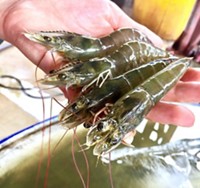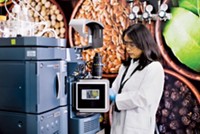Advertisement
Grab your lab coat. Let's get started
Welcome!
Welcome!
Create an account below to get 6 C&EN articles per month, receive newsletters and more - all free.
It seems this is your first time logging in online. Please enter the following information to continue.
As an ACS member you automatically get access to this site. All we need is few more details to create your reading experience.
Not you? Sign in with a different account.
Not you? Sign in with a different account.
ERROR 1
ERROR 1
ERROR 2
ERROR 2
ERROR 2
ERROR 2
ERROR 2
Password and Confirm password must match.
If you have an ACS member number, please enter it here so we can link this account to your membership. (optional)
ERROR 2
ACS values your privacy. By submitting your information, you are gaining access to C&EN and subscribing to our weekly newsletter. We use the information you provide to make your reading experience better, and we will never sell your data to third party members.
Environment
FOOD SAFETY
Companies Support New Testing Laboratories Across The Globe
by Ann M. Thayer
April 30, 2012
| A version of this story appeared in
Volume 90, Issue 18
CORRECTION: This article was updated on May, 23, 2012, to correct the location of Mettler-Toledo’s headquarters. It is Switzerland, not the U.S.
Analytical instrumentation companies are participating in initiatives and partnerships to help support the worldwide exporting and importing of food. As part of the response to changing regulatory requirements around food safety, several companies are equipping laboratories and developing analytical methods. The labs can also help companies establish a foothold in emerging markets.
Mass spectrometry supplier AB Sciex and the separation sciences firm Phenomenex recently developed a method that labs in India can use to screen for pesticides in spices, teas, fruits, and vegetables. According to the companies, India has a growing horticultural industry. Demand for testing also has increased since India implemented a new domestic food safety law in 2011. The system the firms have developed includes instruments, standards, sample-preparation methods, and software.
“We would like to promote the export of fruits and vegetables from India to other countries across the globe,” said Kaushik Banerjee, chief of the National Referral Laboratory on Agrochemical Residues in Horticultural Commodities at India’s National Research Centre for Grapes, when the initiative was announced earlier this month. The new procedure “ensures not only accuracy in the testing results but also compliance with the regulatory demands of global markets,” he added.
Agilent Technologies, meanwhile, is helping the Halal Products Research Institute at the Universiti Putra Malaysia strengthen its capabilities in food authentication and safety. Products deemed “halal” are permitted for consumption by orthodox Muslims and represent 17% of the global food industry, according to the collaborators.
Separately, in March, Agilent joined with the U.S. Food & Drug Administration to develop methods to detect and analyze pathogens in food. An initial goal is to create genotyping assays that can quickly identify Salmonella subtypes, and thus the source of contamination, when outbreaks occur. The partners, along with the Campden BRI laboratory in the U.K., will also work on DNA analysis methods to identify fish species, even after processing. Such tests could help uncover intentional fraud or mislabeling to avoid tariffs and import restrictions.
Waters Corp., the University of Maryland, and FDA opened a food safety training center in September 2011 (C&EN, Nov. 7, 2011, page 22). The lab will help the agency and foreign food producers comply with new regulations, such as the U.S. Food Safety Modernization Act, which went into effect in January 2011. It will provide educational classes and hands-on training.
In November 2011, Waters joined with candy maker Mars Inc. and the U.S. Agency for International Development to pledge $1 million to create the Global Food Safety Capacity Building fund. To be managed by the World Bank, the proposed fund will support and improve global food safety through an expanded understanding of food safety standards and best practices. The fund hopes to raise $15 million to $20 million over 10 years and use it to develop training programs, address high-priority food hazards, and strengthen testing methods.
Such programs aren’t meant to sell the company’s systems and don’t have a direct financial impact, says Rohit Khanna, Waters’ vice president of worldwide marketing. “They really are designed to bring our expertise into those areas where it is lacking.”
Similarly, Thermo Fisher Scientific opened a global food safety response center in Germany in 2010 (C&EN, May 10, 2010, page 28). The center focuses on threats involving chemical contamination, such as that which occurred with the melamine crisis in China. Also in China, PerkinElmer has provided instruments, software, and expertise to the Beijing Municipal Center for Food Safety Monitoring since before the 2008 Olympics.







Join the conversation
Contact the reporter
Submit a Letter to the Editor for publication
Engage with us on Twitter